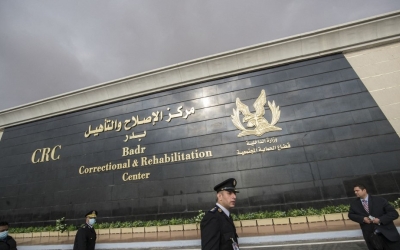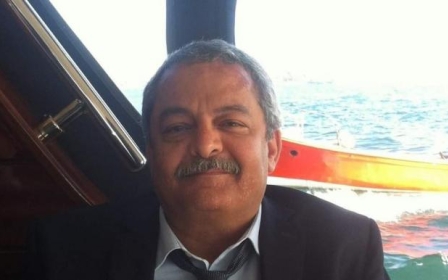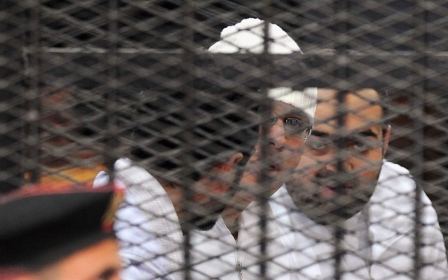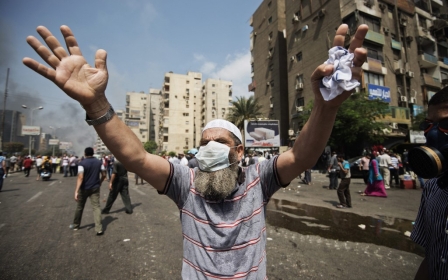Egypt: Leaked videos raise concerns about dire conditions inside Badr prison
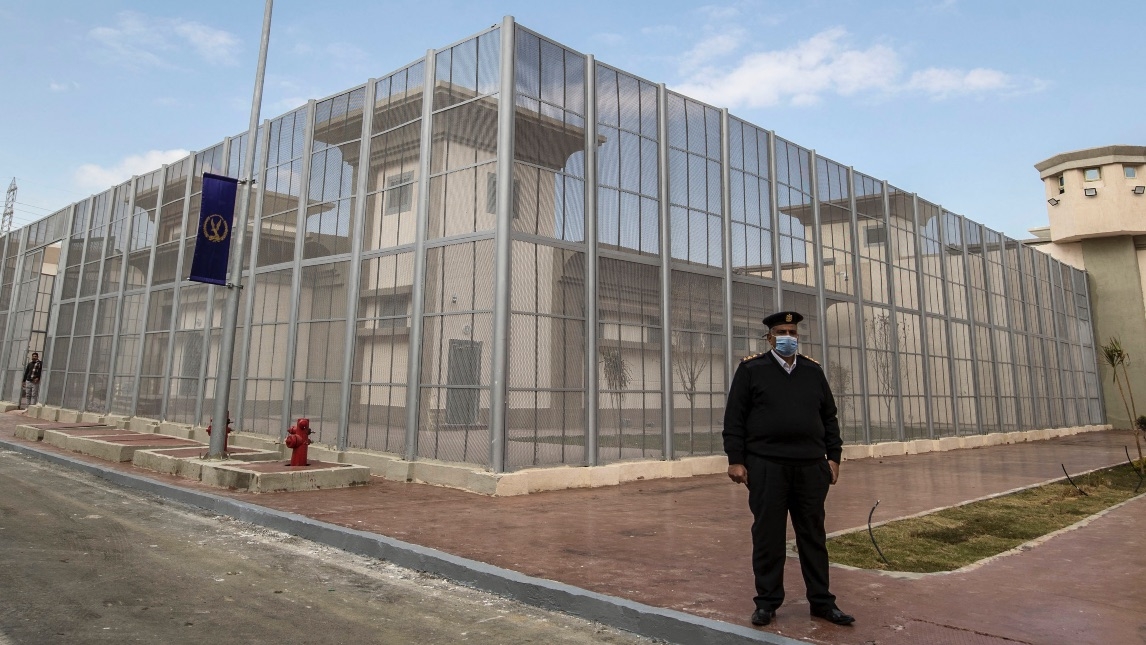
A series of leaked videos from inside one of Egypt's newly constructed prisons has raised serious concerns among rights groups and activists about the conditions of political prisoners, including lack of medical attention, solitary confinement and bans on family visits.
On Monday, a US-based Egyptian social media influencer, Aly Mahdy, posted a video allegedly showing the cells of senior leaders of the Muslim Brotherhood. Middle East Eye could not independently verify the identities of the prisoners, but rights groups confirmed to MEE that the footage was of the Badr prison complex.
One of the videos was purported to be of Salah Soltan, a legal permanent US resident and father of prominent activist Mohamed Soltan. However, the younger Soltan stated on X, formerly known as Twitter, that the man identified in the video was not his father.
The Freedom Initiative, a group that focuses on Saudi and Egyptian prisoners, also confirmed to Middle East Eye that it was not Salah Soltan in the video.
MEE reached out to Mahdy, the Egyptian activist who released the footage, for comment on the leaks, but did not receive a response by time of publication.
New MEE newsletter: Jerusalem Dispatch
Sign up to get the latest insights and analysis on Israel-Palestine, alongside Turkey Unpacked and other MEE newsletters
Allison McManus, senior director of national security at the Center for American Progress, said of the leaked footage that the families of the prisoners did not give permission for the leaks and some, like Mohamed Soltan, are denying that these are their loved ones.
"How these leaks are shared could harm their efforts for release," McManus said on X.
Nevertheless, the videos that were leaked cement what rights groups and Egyptian activists have been warning about for months: that the conditions inside the Badr prison are deplorable and that inmates are suffering from cruel treatment, including medical neglect.
Two of the videos also appear to show that the inmates' bedding only consists of a thin mat that is placed on the floor, while all of the leaked footage shows each inmate is alone.
"The videos confirm what we have heard from families regarding dire conditions of detainment. The violations in Badr are part and parcel of a justice system that lacks transparency, due process and accountability," Amr El-Afifi, research manager at the Freedom Initiative, told MEE.
The Freedom Initiative further called on the Egyptian government to allow international bodies to come in and investigate the conditions within the country's prison system.
A leaked letter from detainees that was shared with MEE in February previously shed light on the grim reality inside the prison, including bans on family visits and inadequate healthcare.
The letter stated that one inmate took his own life in his cell while another had attempted to kill himself after prison officials refused to allow him to contact his family, who live in the region of Turkey that had recently been affected by devastating earthquakes.
The prison cells shown in the videos leaked on Monday and Tuesday are larger than those previously documented, show ample space for the individuals to pray and access to bottled water. However, it is unclear whether the footage was pushed out by authorities as a PR stunt.
The Egyptian interior ministry on Monday denied that the videos depicted any of the leaders of the Muslim Brotherhood, the largest political opposition group in the country. Since the Brotherhood-affiliated former president Mohamed Morsi was ousted by Abdel Fattah el-Sisi, thousands of the group's members have been detained, killed or forced to live in exile for fear of persecution at home since the Brotherhood was outlawed and declared a terrorist organisation.
Morsi died in a court room in June 2019 after being held in solitary confinement for six years, in what UN experts described as "state-sanctioned arbitrary killing".
"All inmates of correctional and rehabilitation centres, including the persons mentioned in these allegations, receive full medical care, use the centres' cafeterias and attend trial sessions in the cases in which they are accused," Egypt's interior ministry said in a Facebook post.
"Legal measures are being taken regarding these allegations and those in charge of them."
'Worse than Scorpion Prison a thousand times over'
Since becoming president in 2014, Sisi has built at least 28 new prisons - more than a third of the total number of prisons in Egypt, now estimated to be 81.
The Badr prison complex, located northeast of Cairo, came about as a result of a new policy launched by Sisi in September 2021. The plan, titled the National Human Rights Strategy, included modernising the country's detention facilities.
Soon afterwards, Cairo opened Badr and Wadi el-Natrun, two large prison complexes, and began relocating political prisoners there. The Badr prison is home to three different prisons including Badr 3, where many high-profile political prisoners have been held after being transferred from the notorious Tora Prison complex - which includes the maximum-security Scorpion prison - in 2022.
'The same officers who oversaw torture at the Scorpion prison moved to Badr'
- Amr El-Afifi, The Freedom Initiative
Sisi promoted the new prison facilities as a model in human rights compliance, but rights groups have criticised them for falling short of international standards and for being worse than the previous prisons where political detainees were being held.
"Our documentations indicate that Badr prison is more notorious than the infamous Scorpion prison," Afifi said.
"The same officers who oversaw torture at the Scorpion prison moved to Badr. The new buildings came with even worse practices."
Till the Last Prisoner, a campaign led by human rights defenders and families of detainees calling for the release of political prisoners in Egypt, released a statement following the leaked footage, stating that it had been monitoring the "ongoing deliberate bans imposed by prison management on access to basic necessities" inside the prison.
The group also noted that surveillance lights and cameras are in operation 24/7, and that many prisoners suffer from a lack of medical care. Till the Last Prisoner said there have been eight recorded deaths in the prison due to "deliberate medical neglect".
"Prisoners in Badr continue to be held in cruel, inhumane and punitive conditions," the campaign said in a statement.
"From the moment the prisoners were transferred to Badr prison, messages and pleas have continuously highlighted the dire conditions of detainment, including systematic collective torture, with some describing the situation as 'worse than Scorpion prison a thousand times over'."
The group also noted that prisoners are denied communication with their families and lawyers, and several families of detainees reported that their visits "do not exceed 20 minutes and were conducted in the presence of guards and prison staff".
Meanwhile, Amnesty International has documented that prisoners in the Badr 3 prison are held in "cruel and inhumane conditions".
"Detainees shiver in cold cells with fluorescent lights switched on round the clock," Amnesty said in a report in October. "CCTV cameras are trained on them at all hours; and access to basic necessities such as sufficient food, clothing and books is banned.
"They are denied any contact with their families or lawyers and detention renewal hearings are held online."
Amnesty decried Egyptian efforts to paint the prison as turning a page on the country's poor prison culture.
While the prison was opened to "great fanfare by the authorities", in reality, Amnesty said, "prisoners are facing the same human rights violations that have repeatedly blighted older institutions, exposing the lack of a political will from the Egyptian authorities to bring an end to the human rights crisis in the country".
Egyptian jails hold an estimated 65,000 political prisoners, arrested for their opposition to the Sisi's government, according to a study released by the Arabic Network for Human Rights in March 2021.
Hundreds of people have perished in prison since Sisi's coup, due to medical negligence and lack of an urgent care system when a detainee suffers a medical emergency, including Morsi and former MP Essam el-Erian.
Middle East Eye delivers independent and unrivalled coverage and analysis of the Middle East, North Africa and beyond. To learn more about republishing this content and the associated fees, please fill out this form. More about MEE can be found here.


